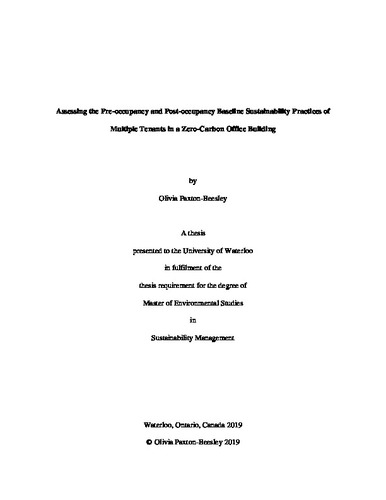| dc.description.abstract | This research assesses the baseline sustainable lifestyle patterns of occupants in a multi-tenant office building in Waterloo, ON designed for next-generation sustainability standards. The building is designed to be zero-carbon and ‘net energy positive’, to generate more energy than it requires to operate annually. This research explores the influence of sustainable and energy efficient designs on lifestyle choices of the zero-carbon building tenants. The thesis seeks to extend the vision of this zero-carbon building as an innovative office building by exploring the pro-environmental awareness and behaviour of its tenants. Data contained within this study indicates a positive relationship between attitudes and behaviours among tenants. This specialized study can help emphasize the significance of this link. The data might in turn contribute to new operating standards for commercial office tenant buildings, supporting improved energy and sustainability performance in workspaces.
The building sector is one of the major contributors to carbon emissions in the world, and the effective reduction of emissions requires significant change in the building industry. Sustainable building design can dramatically reduce carbon emissions associated with the construction and operation of buildings, minimizing harmful environmental impacts. However, there are often performance gaps where the modeled energy performance shown in designs and actual energy performance of occupied buildings do not match. While the building’s energy-positive features help solve the global sustainability challenge, achieving high performance also depends on deliberate patterns of use by tenants and management, requiring elevated awareness among occupants.
This research identifies the self-reported behaviours of the future tenants of the zero-carbon office building prior to the occupancy of the sustainable building, providing a baseline to compare the lifestyle patterns of tenants as they are exposed to a sustainably designed workspace. The study focuses on baseline lifestyle choices by collecting information about commuting choices, diet, and waste habits through an online survey, and on parking lot composition through an observational survey. The study compares patterns among tenants from environmental, information technology, education and accounting industries. In parallel, the study considers the influence of the zero-carbon office building’s architectural features, including geothermal heating, triple-glazed windows, a solar carport, and 28 electric charging stations in its parking lot, together with the location of the development next to a light rail transit station which supports the option of low-carbon mass transportation.
Literature cited within this study includes recent papers that discuss opportunities to engage the occupants of sustainable buildings, and for satisfaction and comfort of occupants in their new spaces. Researchers highlight that behavioural factors are a major contributor to performance gaps, particularly if the lifestyle patterns of occupants are not complemented by the design of the building. Key studies including Carmichael, Preble, Randall, and Steiner, (2017) and Edwards and Kumphai, (2012) demonstrate that widely varying interests in sustainability and energy requirements seen within multi-tenant environments can create difficulty in achieving reductions in energy usage. This thesis contributes to this literature by emphasizing the importance of occupant awareness of sustainability and sustainable behaviours. | en |

